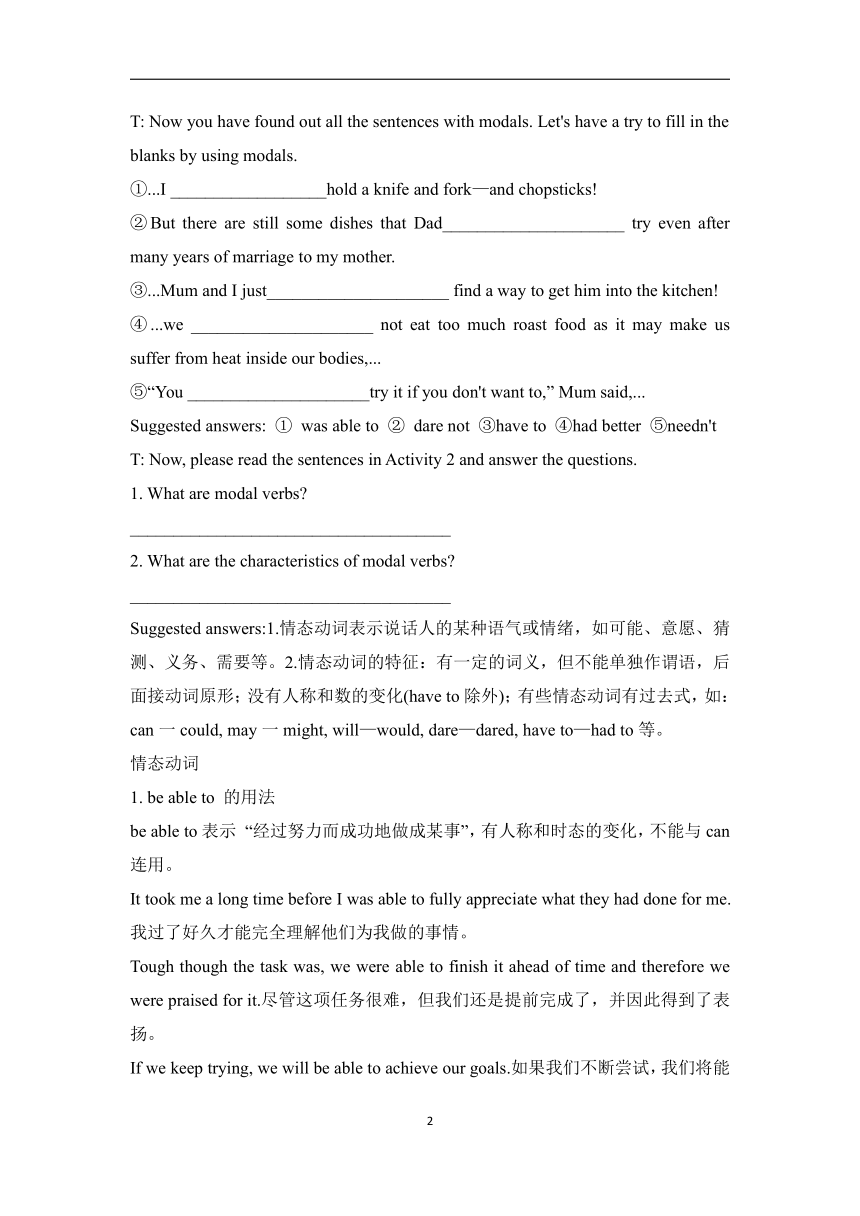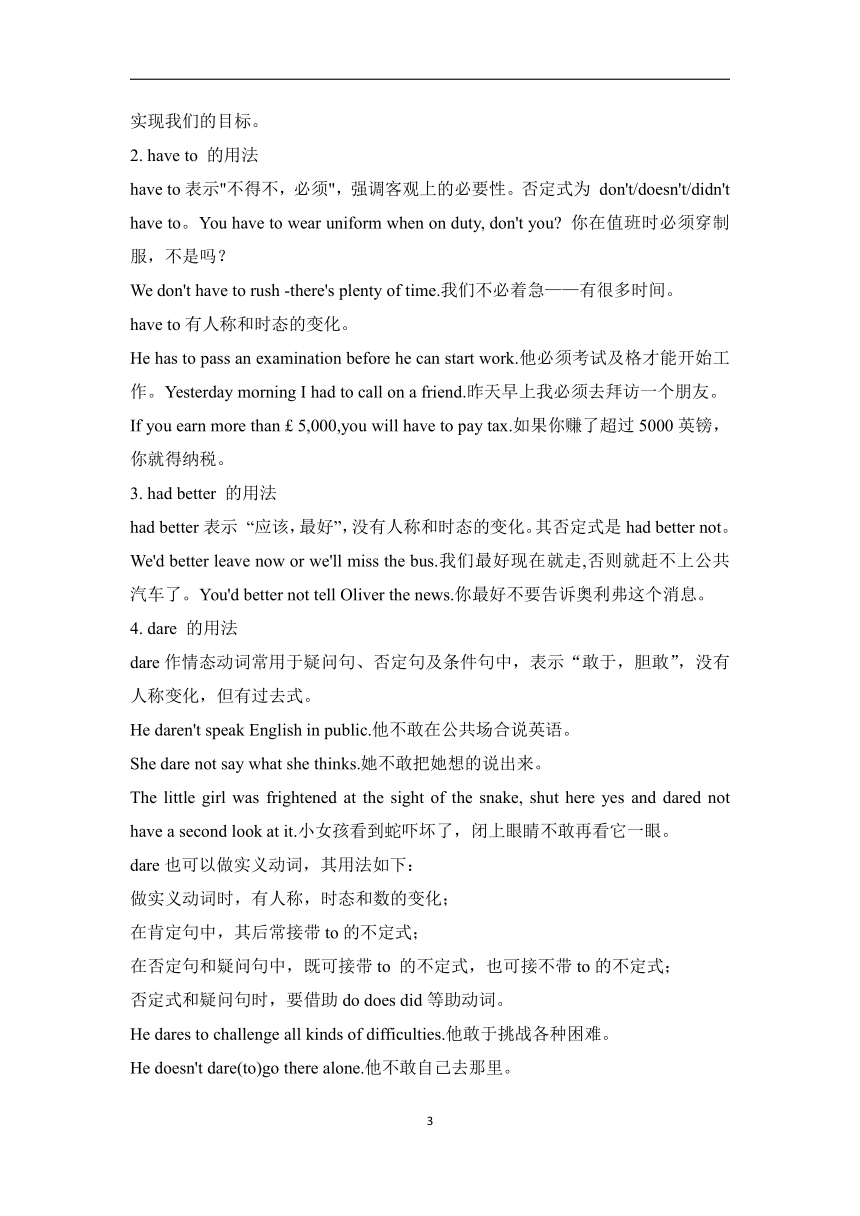外研版(2019)必修第二册Unit 1 Food for thought Section B Using language教案
文档属性
| 名称 | 外研版(2019)必修第二册Unit 1 Food for thought Section B Using language教案 |

|
|
| 格式 | doc | ||
| 文件大小 | 52.0KB | ||
| 资源类型 | 教案 | ||
| 版本资源 | 外研版(2019) | ||
| 科目 | 英语 | ||
| 更新时间 | 2022-10-22 00:00:00 | ||
图片预览



文档简介
Unit 1 Food for thought
Using language教学设计
科目:英语 课题:Using language 课时:1课时
教学目标与核心素养:
知识目标:学生掌握情态动词的功能意义并且能够根据背景选择适当的情态动词
能力目标:学生能够理解情态动词的语法意义并且完成练习
情感目标:学生提高健康饮食的意识
教学重难点
教学重点:引导学生理解情态动词
教学难点:适当的使用情态动词
课前准备:多媒体,黑板,粉笔
教学过程:
一、Pre-reading
1. Greeting
2. Leading-in
Hello! Boys and girls. Today we'll learn something about modals. I think you have got to know something about modals in your learning. Let's check how you are get-ting along with this grammar. First, please find out all the sentences with modals in the passage A Child of Two Cui-sines and analyze the function of them.
Activity 1: Find out the sentences with modals in the reading passage.
Suggested answers: ①...I was able to hold a knife and fork—and chop sticks!
②But there are still some dishes that Dad dare not try even after many years of marriage to my mother.
③... Mum and I just have to find a way to get him into the kitchen!
④... we'd better not eat too much roast food as it may make us suffer from heat inside our bodies,...⑤“You needn't try it if you don't want to,” Mum said,...
二、While- reading
Activity 2: Fill in the blanks by using correct modal verbs
T: Now you have found out all the sentences with modals. Let's have a try to fill in the blanks by using modals.
①...I __________________hold a knife and fork—and chopsticks!
②But there are still some dishes that Dad_____________________ try even after many years of marriage to my mother.
③...Mum and I just_____________________ find a way to get him into the kitchen!
④...we _____________________ not eat too much roast food as it may make us suffer from heat inside our bodies,...
⑤“You _____________________try it if you don't want to,” Mum said,...
Suggested answers: ① was able to ② dare not ③have to ④had better ⑤needn't
T: Now, please read the sentences in Activity 2 and answer the questions.
1. What are modal verbs
_____________________________________
2. What are the characteristics of modal verbs
_____________________________________
Suggested answers:1.情态动词表示说话人的某种语气或情绪,如可能、意愿、猜测、义务、需要等。2.情态动词的特征:有一定的词义,但不能单独作谓语,后面接动词原形;没有人称和数的变化(have to除外);有些情态动词有过去式,如:can一could, may一might, will—would, dare—dared, have to—had to等。
情态动词
1. be able to 的用法
be able to表示 “经过努力而成功地做成某事”,有人称和时态的变化,不能与can连用。
It took me a long time before I was able to fully appreciate what they had done for me.我过了好久才能完全理解他们为我做的事情。
Tough though the task was, we were able to finish it ahead of time and therefore we were praised for it.尽管这项任务很难,但我们还是提前完成了,并因此得到了表扬。
If we keep trying, we will be able to achieve our goals.如果我们不断尝试,我们将能实现我们的目标。
2. have to 的用法
have to表示"不得不,必须",强调客观上的必要性。否定式为 don't/doesn't/didn't have to。You have to wear uniform when on duty, don't you 你在值班时必须穿制服,不是吗?
We don't have to rush -there's plenty of time.我们不必着急——有很多时间。
have to有人称和时态的变化。
He has to pass an examination before he can start work.他必须考试及格才能开始工作。Yesterday morning I had to call on a friend.昨天早上我必须去拜访一个朋友。
If you earn more than 5,000,you will have to pay tax.如果你赚了超过5000英镑,你就得纳税。
3. had better 的用法
had better表示 “应该,最好”,没有人称和时态的变化。其否定式是had better not。
We'd better leave now or we'll miss the bus.我们最好现在就走,否则就赶不上公共汽车了。You'd better not tell Oliver the news.你最好不要告诉奥利弗这个消息。
4. dare 的用法
dare作情态动词常用于疑问句、否定句及条件句中,表示“敢于,胆敢”,没有人称变化,但有过去式。
He daren't speak English in public.他不敢在公共场合说英语。
She dare not say what she thinks.她不敢把她想的说出来。
The little girl was frightened at the sight of the snake, shut here yes and dared not have a second look at it.小女孩看到蛇吓坏了,闭上眼睛不敢再看它一眼。
dare也可以做实义动词,其用法如下:
做实义动词时,有人称,时态和数的变化;
在肯定句中,其后常接带to的不定式;
在否定句和疑问句中,既可接带to 的不定式,也可接不带to的不定式;
否定式和疑问句时,要借助do does did等助动词。
He dares to challenge all kinds of difficulties.他敢于挑战各种困难。
He doesn't dare(to)go there alone.他不敢自己去那里。
5. need 的用法
need作情态动词多用在疑问句和否定句中,表示“需要”,没有时态和人称的变化。
If she wants anything, she need only ask.她如果想要什么东西,只要开一下口就行了。
This is free service; you needn't pay for it.这是免费服务,你不必付钱。
对need引出的一般疑问句作肯定回答时要用must,作否定回答时要用 needn't或don't have to。
-Need I hand in the application now 我需要现在交申请表吗?
-Yes, you must./No, you don't have to.是的,你必须(现在交)。/不,你不必(现在交)。
Conjecture of modal verbs
1.can用于肯定句中表示客观的可能性,意为“有时会”;用于疑问句中可以表示推测,意为“可能”,有时表示一种惊讶的语气;用于否定句中也可以表示推测,can't意为“不可能”,语气很强烈。
2.may/might用于肯定句中可以用来表示不十分肯定的推测,意为“有可能”;用于否定句中也可以表示推测,may not意为“可能不”,表示一种不太确定的语气。
3.must表示推测时只能用于肯定句中,意为“一定,必定”,表示十分肯定的语气(在疑问句中或否定句中要用can/could)。
4.should用来表示推测时意为“应该”,即含有“按道理来说应当如此”的意思。情态动词+动词原形:表示对现在或将来的推测情态动词+be +doing:表示对某刻正在发生的动作的推测
情态动词+have done 用法
must have done 一定做过某事,其否定形式为can't/couldn't have done
can/could have done 1.本来能够做某事却未做 2.可能做过某事
can't/couldn't have done 不可能做过某事
may/might have done 或许/可能做过某事
should/ought to have done 本该做某事却未做,其否定形式表示本不该做某事却做了
needn't have done 做了本没有必要做的事情
即时训练1:翻译句子
①他准是个美国人。
________________________________
②他肯定正在教室里做练习。
________________________________
③他不可能知道我的地址。
________________________________
④昨晚一定下雨了,是不是
________________________________
即时训练2:单句语法填空
① You'd better put on a heavy coat. Sometimes it_______ be very cold here at night.
②It_______ be the vocabulary that caused you the problem in the exercise because you know a lot of words.
③-Good morning. I've got an appointment with Miss Smith in the Personnel Department.
-Ah, good morning. You______ be Mrs. Peters.
④You________ have hurried. I have lots of time.
Suggested answers: 即时训练1①He must be an American.②He must be doing his exercises in the classroom.③He can't know my address.④It must have rained last night, didn't it
即时训练2 ①can ②couldn't ③must ④needn't
三、After-reading
Consolidation
Finish the passage
Miss Fang ______ not read for very long with her eyes hurt. Her mother told her that she_____ go to hospital and see a doctor. “You ______ see a doctor as soon as possible,” her mother said.
When Miss Fang had free time, she went to hospital. The clerk said that the doctor ______ see her at 3:30.
Miss Fang replied that she would not_______ be there at 3:30, because she______ have an important test then. She asked the clerk if she______ arrange the examination at about ten tomorrow.
答案:could; should; had better; could; be able to; had to; could
四、Summary
总结课上所学
五、Homework 完成本节课同步练习
2
Using language教学设计
科目:英语 课题:Using language 课时:1课时
教学目标与核心素养:
知识目标:学生掌握情态动词的功能意义并且能够根据背景选择适当的情态动词
能力目标:学生能够理解情态动词的语法意义并且完成练习
情感目标:学生提高健康饮食的意识
教学重难点
教学重点:引导学生理解情态动词
教学难点:适当的使用情态动词
课前准备:多媒体,黑板,粉笔
教学过程:
一、Pre-reading
1. Greeting
2. Leading-in
Hello! Boys and girls. Today we'll learn something about modals. I think you have got to know something about modals in your learning. Let's check how you are get-ting along with this grammar. First, please find out all the sentences with modals in the passage A Child of Two Cui-sines and analyze the function of them.
Activity 1: Find out the sentences with modals in the reading passage.
Suggested answers: ①...I was able to hold a knife and fork—and chop sticks!
②But there are still some dishes that Dad dare not try even after many years of marriage to my mother.
③... Mum and I just have to find a way to get him into the kitchen!
④... we'd better not eat too much roast food as it may make us suffer from heat inside our bodies,...⑤“You needn't try it if you don't want to,” Mum said,...
二、While- reading
Activity 2: Fill in the blanks by using correct modal verbs
T: Now you have found out all the sentences with modals. Let's have a try to fill in the blanks by using modals.
①...I __________________hold a knife and fork—and chopsticks!
②But there are still some dishes that Dad_____________________ try even after many years of marriage to my mother.
③...Mum and I just_____________________ find a way to get him into the kitchen!
④...we _____________________ not eat too much roast food as it may make us suffer from heat inside our bodies,...
⑤“You _____________________try it if you don't want to,” Mum said,...
Suggested answers: ① was able to ② dare not ③have to ④had better ⑤needn't
T: Now, please read the sentences in Activity 2 and answer the questions.
1. What are modal verbs
_____________________________________
2. What are the characteristics of modal verbs
_____________________________________
Suggested answers:1.情态动词表示说话人的某种语气或情绪,如可能、意愿、猜测、义务、需要等。2.情态动词的特征:有一定的词义,但不能单独作谓语,后面接动词原形;没有人称和数的变化(have to除外);有些情态动词有过去式,如:can一could, may一might, will—would, dare—dared, have to—had to等。
情态动词
1. be able to 的用法
be able to表示 “经过努力而成功地做成某事”,有人称和时态的变化,不能与can连用。
It took me a long time before I was able to fully appreciate what they had done for me.我过了好久才能完全理解他们为我做的事情。
Tough though the task was, we were able to finish it ahead of time and therefore we were praised for it.尽管这项任务很难,但我们还是提前完成了,并因此得到了表扬。
If we keep trying, we will be able to achieve our goals.如果我们不断尝试,我们将能实现我们的目标。
2. have to 的用法
have to表示"不得不,必须",强调客观上的必要性。否定式为 don't/doesn't/didn't have to。You have to wear uniform when on duty, don't you 你在值班时必须穿制服,不是吗?
We don't have to rush -there's plenty of time.我们不必着急——有很多时间。
have to有人称和时态的变化。
He has to pass an examination before he can start work.他必须考试及格才能开始工作。Yesterday morning I had to call on a friend.昨天早上我必须去拜访一个朋友。
If you earn more than 5,000,you will have to pay tax.如果你赚了超过5000英镑,你就得纳税。
3. had better 的用法
had better表示 “应该,最好”,没有人称和时态的变化。其否定式是had better not。
We'd better leave now or we'll miss the bus.我们最好现在就走,否则就赶不上公共汽车了。You'd better not tell Oliver the news.你最好不要告诉奥利弗这个消息。
4. dare 的用法
dare作情态动词常用于疑问句、否定句及条件句中,表示“敢于,胆敢”,没有人称变化,但有过去式。
He daren't speak English in public.他不敢在公共场合说英语。
She dare not say what she thinks.她不敢把她想的说出来。
The little girl was frightened at the sight of the snake, shut here yes and dared not have a second look at it.小女孩看到蛇吓坏了,闭上眼睛不敢再看它一眼。
dare也可以做实义动词,其用法如下:
做实义动词时,有人称,时态和数的变化;
在肯定句中,其后常接带to的不定式;
在否定句和疑问句中,既可接带to 的不定式,也可接不带to的不定式;
否定式和疑问句时,要借助do does did等助动词。
He dares to challenge all kinds of difficulties.他敢于挑战各种困难。
He doesn't dare(to)go there alone.他不敢自己去那里。
5. need 的用法
need作情态动词多用在疑问句和否定句中,表示“需要”,没有时态和人称的变化。
If she wants anything, she need only ask.她如果想要什么东西,只要开一下口就行了。
This is free service; you needn't pay for it.这是免费服务,你不必付钱。
对need引出的一般疑问句作肯定回答时要用must,作否定回答时要用 needn't或don't have to。
-Need I hand in the application now 我需要现在交申请表吗?
-Yes, you must./No, you don't have to.是的,你必须(现在交)。/不,你不必(现在交)。
Conjecture of modal verbs
1.can用于肯定句中表示客观的可能性,意为“有时会”;用于疑问句中可以表示推测,意为“可能”,有时表示一种惊讶的语气;用于否定句中也可以表示推测,can't意为“不可能”,语气很强烈。
2.may/might用于肯定句中可以用来表示不十分肯定的推测,意为“有可能”;用于否定句中也可以表示推测,may not意为“可能不”,表示一种不太确定的语气。
3.must表示推测时只能用于肯定句中,意为“一定,必定”,表示十分肯定的语气(在疑问句中或否定句中要用can/could)。
4.should用来表示推测时意为“应该”,即含有“按道理来说应当如此”的意思。情态动词+动词原形:表示对现在或将来的推测情态动词+be +doing:表示对某刻正在发生的动作的推测
情态动词+have done 用法
must have done 一定做过某事,其否定形式为can't/couldn't have done
can/could have done 1.本来能够做某事却未做 2.可能做过某事
can't/couldn't have done 不可能做过某事
may/might have done 或许/可能做过某事
should/ought to have done 本该做某事却未做,其否定形式表示本不该做某事却做了
needn't have done 做了本没有必要做的事情
即时训练1:翻译句子
①他准是个美国人。
________________________________
②他肯定正在教室里做练习。
________________________________
③他不可能知道我的地址。
________________________________
④昨晚一定下雨了,是不是
________________________________
即时训练2:单句语法填空
① You'd better put on a heavy coat. Sometimes it_______ be very cold here at night.
②It_______ be the vocabulary that caused you the problem in the exercise because you know a lot of words.
③-Good morning. I've got an appointment with Miss Smith in the Personnel Department.
-Ah, good morning. You______ be Mrs. Peters.
④You________ have hurried. I have lots of time.
Suggested answers: 即时训练1①He must be an American.②He must be doing his exercises in the classroom.③He can't know my address.④It must have rained last night, didn't it
即时训练2 ①can ②couldn't ③must ④needn't
三、After-reading
Consolidation
Finish the passage
Miss Fang ______ not read for very long with her eyes hurt. Her mother told her that she_____ go to hospital and see a doctor. “You ______ see a doctor as soon as possible,” her mother said.
When Miss Fang had free time, she went to hospital. The clerk said that the doctor ______ see her at 3:30.
Miss Fang replied that she would not_______ be there at 3:30, because she______ have an important test then. She asked the clerk if she______ arrange the examination at about ten tomorrow.
答案:could; should; had better; could; be able to; had to; could
四、Summary
总结课上所学
五、Homework 完成本节课同步练习
2
